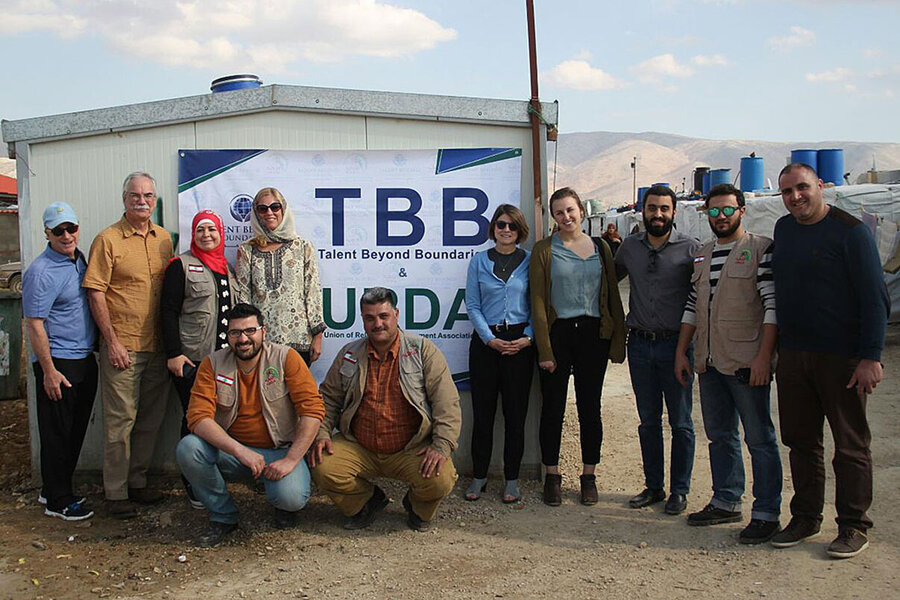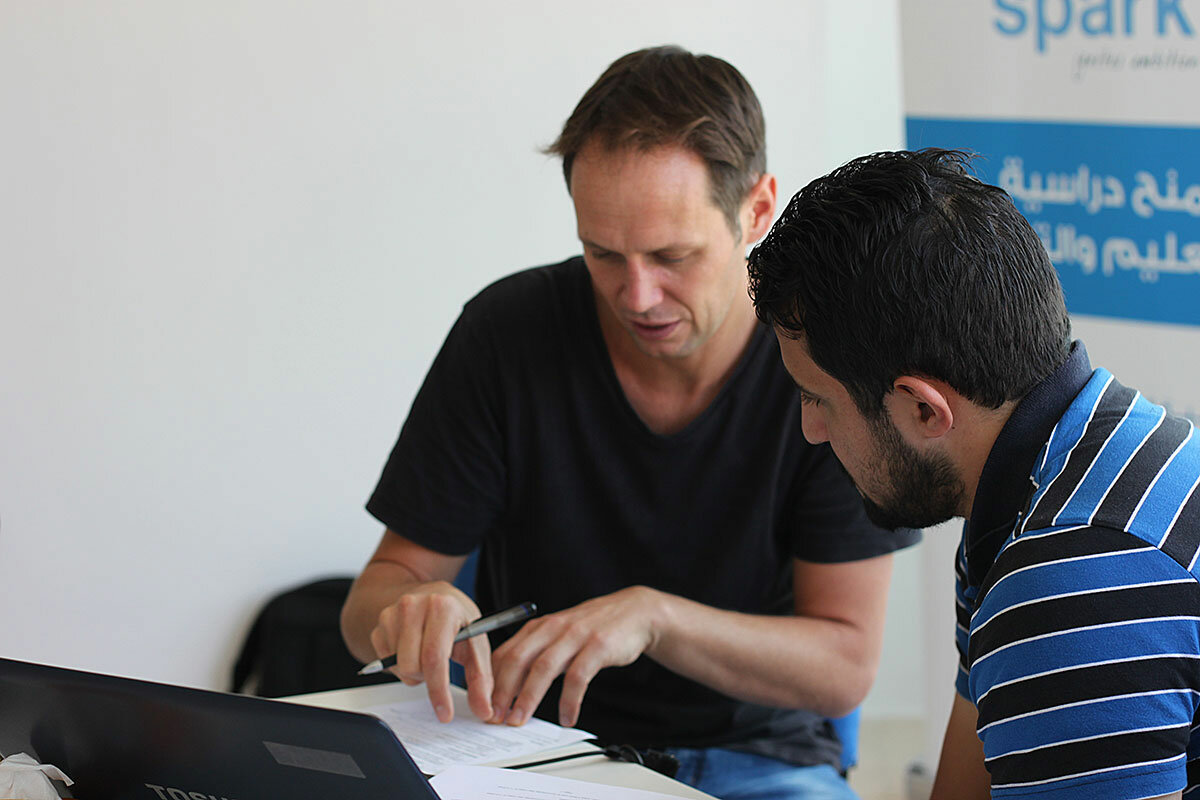In global refugee flow, Canada finds a surprising solution to a labor shortage
Loading...
| Toronto
Nagham Abu Issa was working as an executive assistant in a cement factory in Damascus when the civil war started in Syria. Her family fled to Lebanon. But with no job prospects there, her siblings left on the risky passage to Europe. Ms. Abu Issa, the eldest daughter, stayed behind with her mother.
She is a refugee. She is also a valuable employee. She has a degree from Damascus University in English literature and has studied human resources. As she worked her way up in her job, she had big dreams – to become a chief operating officer or even start her own company one day.
“My communication skills are my strongest asset, both internally and externally,” she says in an interview over Skype.
Why We Wrote This
Yes, refugees need help, but sometimes they also can lend a helping hand. A program that places skilled refugees in jobs in Canada helps resettle uprooted people and may help fill a labor shortage there.
Now she hopes to take that savvy to Canada, not through resettlement but to fill the country’s labor gaps. She has interviewed with Talent Beyond Boundaries (TBB), an international NGO that has started pilots in Canada and Australia to match a small number of refugees based in Lebanon and Jordan with employment opportunities abroad.
The experiment so far is tiny, but it’s aiming high: to forge a new pathway for refugees to be recognized for what they can bring to a country, not for the state of the countries they were forced to leave. In so doing, TBB hopes to shift attitudes about refugees among Western nations and their immigration systems, some of which are under assault by the rise of populism and nativism.
Bruce Cohen, co-founder of TBB and former chief counsel and staff director for the US Senate Judiciary Committee, says that when they began at the height of the refugee crisis in Europe in 2014 and 2015, he was often told there were no talented refugees left. So his group created a searchable database for displaced jobseekers in Lebanon and Jordan that today holds more than 11,000 resumes. “Everyone from engineers to nurses, and also the skilled trades, carpenters, welders, plumbers, butchers, chefs, you name it, it probably is represented in the refugee community,” he says. “It is really getting rid of this image of refugees as unskilled, poor, pitiful.”
Building support systems
Their effort comes amid a much larger conversation about adapting the global refugee system, built after World War II, to the realities of long-term conflict. In 2017, 68.5 million people were forced to leave their homes, with 25.4 million becoming refugees outside their home countries. The vast majority are in countries that border conflict, such as Jordan, Lebanon, or Turkey. The global system currently envisions that refugees will voluntarily return when conflict ends, integrate where they first land, or be resettled elsewhere, an option limited to the most vulnerable.
By the end of the year, United Nations members are expected to endorse the Global Compact on Refugees, an international agreement that envisions more solidarity between countries hosting the majority of refugees on issues like resettlement and other pathways to third countries, which is where a program such as TBB would fit.
The group is not alone in grappling with how to put refugees to work. In the United States, the Tent Partnership for Refugees works with businesses to facilitate refugee hires, both in countries to which they first flee and where they are ultimately resettled.
Tent Partnership’s leaders argue that it is not just the right thing to do, it makes both strategic and business sense. A report released by Tent and the Fiscal Policy Institute in May, for example, showed higher retention rates and resilience among the refugee workforce in the US market. “Our key principle is that businesses can and should be doing more to support refugees,” says Gideon Maltz, the executive director of Tent Partnership for Refugees, who supports the TBB model as an additional option.
In Canada jobs are plentiful. The government recently announced it will take in 350,000 immigrants in 2021, or 40,000 more than it expects to admit this year. Canadian employers have also expressed interest in hiring refugees.
The Fairmont Chateau Whistler in British Columbia is just one example. The hotel offered jobs and housing to 12 refugees overseas who are now in the process of entering Canada as privately sponsored refugees. Four have already arrived. “The limitation is not on the jobs,” says Laurie Cooper, a private sponsor who helped facilitate the arrangement. She says she wishes the process were faster.
That is where TBB is attempting to make a difference, though their work is slow too, as they attempt to create a new pathway. In Canada, TBB has so far only secured 7 formal offers. The program works with federal and provincial governments on visas and connects employers to refugee talent. It helps businesses overcome legal barriers refugees face that traditional economic migrants would not, such as a lack of passports or access to education records.
Creative solutions for the refugee system
Susan Fratzke, policy analyst at the Migration Policy Institute, says TBB could scale up in Canada or Australia because of their robust economic migration systems. And other countries may look to economic migration for refugees as a model. “If you look at conversations about resettlement or asylum in Europe, there is a lot of concern about how people will be integrated, how they will find jobs,” Ms. Fratzke says. “If you are providing a pathway for people coming with an offer of work, that addresses some of those issues.”
Abu Issa says that one of her brothers, now a refugee in Sweden, applied for family reunification, but the claim was rejected. So she and her mother are still in Lebanon, more than five years after they first arrived, where work has been precarious and sexual harassment a constant concern. She has been in contact with international organizations that offer refugees the chance to study. “But I’m not a student. I’m a graduate,” she says. “My dream is to move with a job, to prove myself because of my work.”
Labor pathways for refugees have faced criticism by those who see it as a neoliberal overlay onto the refugee system. Mr. Cohen, the TBB co-founder, says it is meant to complement the current system, not take away from it. It is designed to reach skilled refugees who aren’t “vulnerable enough” to qualify for resettlement, he says. “[This program] is to say you can move based on your skills and abilities,” he says. “You move to a job that benefits from your skills. And that is a way back to self-reliance.”
Heather Segal, founder of Segal Immigration Law in Toronto, is working pro-bono with TBB because she says too many skilled refugees stagnate while nations like Canada face labor shortages. “Why are we obviating a group of educated, skilled people because their country fell apart?” she says. “There is a gap here that needs to be addressed…. We need creative solutions for the refugee system in the 21st century.”










